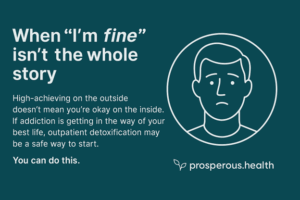When “I’m Fine” Isn’t the Whole Story
If you’re successful at work, respected in your field, or managing life on paper—it’s easy to tell yourself, “This can’t be a problem.” But addiction doesn’t always look like falling apart. For high-functioning professionals, it can look like overachievement, perfectionism, or quiet rituals of control.
As an addiction counselor, I’ve worked with many people who kept everything looking “normal” while privately struggling with dependence. They weren’t out of control. They were in control of everything—except this.
This post is for the people who smile in meetings, crush deadlines, and then pour a drink in silence or pop a pill just to come down. We’ll explore how denial shows up differently for high performers—and how Outpatient Detoxification can be a discreet, empowering first step back to yourself.
High Performance Can Be a Shield
One of the most common forms of denial I see is tied to productivity. When things are still getting done, it’s easy to convince yourself there’s no problem. You’re meeting deadlines, closing deals, maybe even getting promotions.
But high-functioning doesn’t mean healthy.
A startup founder runs on three hours of sleep, caffeine, and unprescribed Adderall. She just raised a funding round—but can’t remember the last time she went a day without stimulants.
A nurse clocks 12-hour shifts with a perfect attendance record. He’s also taking leftover oxycodone from a dental procedure “just to take the edge off” after work.
Another client, a commercial real estate broker, once told me, “I can’t have a problem. I’m the one people come to when everything falls apart.” But behind closed doors, his drinking was the one thing he couldn’t hold together.
In all of these cases, performance is being propped up by substances. But on the surface? Everything looks fine. That’s what makes this version of denial so difficult—and so dangerous.

Denial Isn’t Lying—It’s Rationalizing
Denial isn’t always a conscious decision. It often shows up in quiet self-talk and clever mental math.
You might say:
- “I’m not using every day—only when it’s really stressful.”
- “I’m just drinking to loosen up at networking events.”
- “I’ve never missed work. I’m not like those people.”
A trial attorney once told me, “I don’t have a problem. I win cases.” But he’d also quietly started drinking in the morning to steady his hands before court.
Denial for professionals often comes dressed as logic. But if you find yourself explaining away things that would concern you in someone else, it may be time to step back.
Because deep down, you know: functioning doesn’t mean thriving. Keeping it together on the outside doesn’t mean you’re okay on the inside.
Physical Dependence Can Still Be Present
You don’t need to lose everything to have a legitimate, clinical need for help.
If you’ve:
- Tried to stop or cut back and felt sick, anxious, or shaky
- Needed more of the substance to get the same effect
- Found yourself building your day around when you can use
…you may be dealing with physical dependence—even if life on the outside looks intact.
A marketing exec I worked with said, “I only drink at home, after work.” But his “one glass of wine” had quietly become a bottle and a half. When he skipped a night, he couldn’t sleep—and started sweating through his sheets.
He hadn’t “hit bottom.” But his body had already become dependent. Physical dependence doesn’t wait for disaster to arrive. It just slowly erodes your stability behind the scenes.
Outpatient Detox Offers a Discreet, Safe Option
If the idea of checking into a facility makes you hesitate, you’re not alone. Many high-functioning professionals delay seeking help because they’re afraid of what it might look like—or what others might think.
Outpatient detox is different.
It can look like this:
- You visit a clinic once a day, much like a normal doctor’s appointment. No overnight stays, no hospital gowns—just a calm, private space where you’re medically supported and then go home.
- Or, depending on your situation, a licensed medical provider might come to you—monitoring your vitals, managing symptoms, and guiding you through withdrawal in the privacy of your own home.
Discretion isn’t a compromise in care. At Prosperous Health, we believe it’s often necessary for medical safety—because we know some people won’t seek help at all if the process feels too exposed.
Outpatient detox is designed to meet you where you are—physically and emotionally—so that fear doesn’t become the reason you wait too long to get safe.
Early Action Is Protective, Not Punitive
The earlier you address substance use, the more control you retain over the outcome. Choosing outpatient detox before a crisis means:
- Fewer health complications
- More treatment options
- Greater emotional readiness
- Less risk to career, relationships, or reputation
Think of it as a form of quiet leadership—choosing to intervene early, not because everything’s falling apart, but because you’re smart enough to know where things are heading.
When you’re feeling ready for real change, outpatient detox is a way to act before things spiral.
If You’re Quietly Struggling—We See You
If you’ve been holding it together on the outside while quietly wondering if your substance use has gone too far, you’re not alone—and you’re not too late.
You don’t have to explain anything to anyone. You don’t have to hit bottom. And you definitely don’t have to choose between your health and your privacy.
Outpatient Detoxification is designed for people just like you. High-functioning. High pressure. High stakes. You can detox safely, quietly, and professionally—with your dignity intact and your body fully supported.
💬 You Can Do This—Detox on Your Terms
Talk to us. We’ll help you decide if outpatient detox is the right next step.
No judgment. No lectures.
Just real support from people who get what’s at risk—and how to protect it. Call Today (888)308-4057

